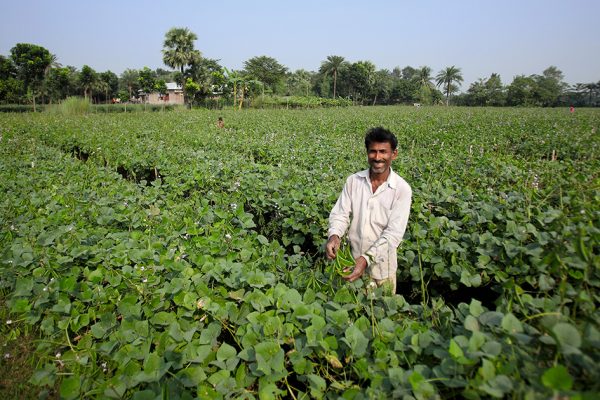The entrepreneurs continuing Bangladesh’s sanitation revolution
Reading Time: 2 minutes
Bangladesh’s drive towards zero open defecation led to an increase in demand for high-quality latrine building materials in both rural and urban areas. This created an opportunity for people to unlock their entrepreneurial spirit while contributing to better sanitation in their communities.
Toilets are still a taboo in many parts of the world. So too, is entrepreneurship for women.
Bhuli Begum took on this twin taboo and turned it into a business opportunity in Patuakhali, southern Bangladesh.
Bangladesh is on the frontline of the climate crisis – and Patuakhali is one of the worst-affected areas. The region is dominated by the coast of the mighty Bay of Bengal, and water, sanitation and hygiene are under constant threat by the many tentacled impacts of the climate crisis.
A sanitation revolution
Bangladesh’s drive for zero open defecation led to widespread adoption of hygiene infrastructure. Household-level infrastructure generally comprises a toilet, situated at the edge of the household compound, enclosed by tin sheets. This works well in terms of affordability, but due to the lack of manufacturing know-how and sub-par quality of many of the ring slabs used in construction, when floods hit and wash away the soil around the ring slabs, these slabs crumble away under the pressure of its own weight.
It was evident that it was an issue of access to sanitation infrastructure products and a certain demand for those products had developed locally courtesy of a mass behaviour change campaign by the government, encouraging use of sanitary latrines in the preceding decades.
Now, the big question was – how do we create a sustainable solution to this problem of access to a product?
BRAC recognised that the market was ready for sanitation enterprises which will have quality as their cornerstone. It will tackle the twin issues of a dearth of durable latrine building materials as well as create income generation. So, BRAC introduced the concept of ‘sanitary entrepreneurs’ through the BRAC Water, Sanitation and Hygiene (WASH) programme.
Rather than simply donating materials, the programme provides loans to individuals from local communities to set up sanitation businesses. These sanitation entrepreneurs, of whom there are now more than 3,000, are trained in both proper latrine manufacturing practices and entrepreneurship.

Bhuli Begum proudly standing in front of her shop where she sells sanitary latrine products. Photo credit: Fateema Kawsar June. © BRAC 2022
Genesis of a sanitary entrepreneur
Bhuli Begum always had an enterprising spirit. Six years ago, when her husband fell ill and was unable to work anymore, she had to take on the responsibility of her family, becoming the sole breadwinner. She took over a small shop owned by her family. But business was slow.
In 2017, Bhuli learned about BRAC’s initiative of ‘sanitary entrepreneurs’, which offers loans for new sanitary businesses. Bhuli secured a loan of Tk 50,000 to start her business and bought supplies for retail. She also received several training sessions on how to run a business.
Undaunted, she took the bold decision to become a sanitation entrepreneur, tackling the problem of poor sanitation in her community while ensuring a steady income for her family.
Today, Bhuli stands proud of the business she has built. She now makes around fifteen thousand taka per month. But it is not just about money. She has also emerged as a strong advocate for proper sanitary infrastructure in her community, adding to her social capital.
“I am happy that I could change the course of my life and ensure a stable income for my family. I can proudly say that I am the first woman entrepreneur in the sanitation business in my neighbourhood,” said Bhuli.
BRAC Water, Sanitation and Hygiene (WASH) programme has made a critical contribution to sanitation in Bangladesh, reaching half the country with services. It has helped over 44.20 million people gain access to hygienic latrines, reached 13.9 million people with hygiene education, and 2.77 million people with access to safe drinking water. Targeted water and sanitation financing, entrepreneur development and financing, loans for people living in poverty, grants and water subsidy for the people living in ultra-poverty, along with motivation for self-financing has ensured equal access for all wealth categories.
Fateema Kawsar June is Deputy Manager, Knowledge Management and Innovation at BRAC.





